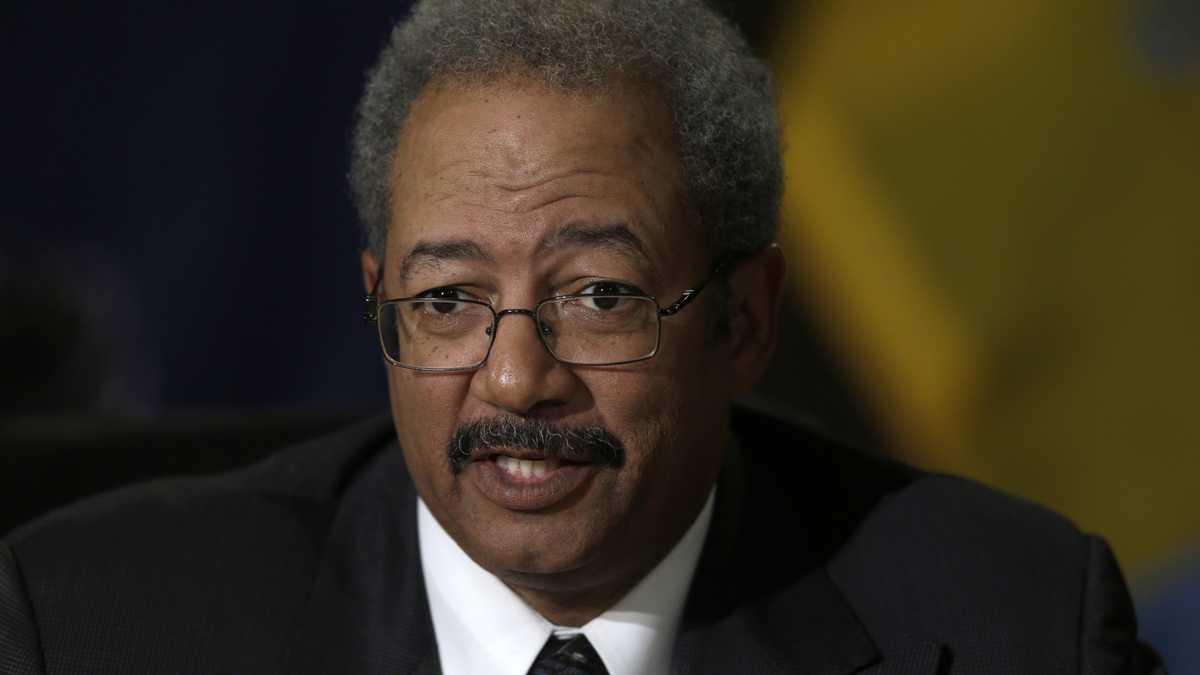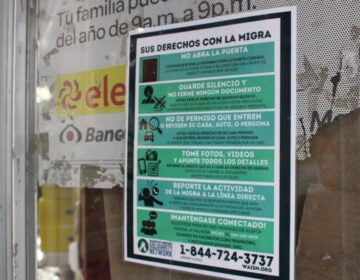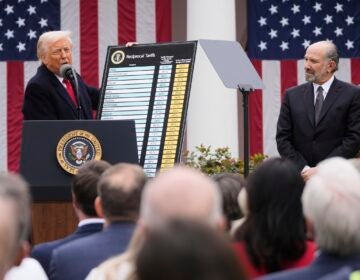Fattah corruption trial underway
Listen
(Matt Rourke/AP Photo)
For nearly a year, indicted U.S. Rep. Chaka Fattah has minimized the lengthy list of corruption charges threatening to stain his two decades in Congress and, should he be convicted, send him to jail.
He’s repeatedly called the 24 counts filed against him “frivolous” and a “smear,” all while fiercely maintaining his innocence and predicting complete exoneration.
On Monday, the government — and the public — finally got a glimpse of the legal defense stoking Fattah’s confidence.
In his opening statement, Mark Lee, one of three attorneys representing Fattah, said his client “had nothing to do” with any of the five schemes alleged in the 85-page indictment filed against Fattah and four associates.
Instead, Lee said, it was one of two political consultants who pulled the strings.
Fattah, 59, is charged with racketeering, bribery, bank fraud, wire fraud and other offenses over the alleged misuse of hundreds of thousands of dollars in charitable donations, grant money, and campaign contributions.
In the scheme at the heart of the case, Fattah is accused of taking an illegal $1 million loan to prop up his failed campaign for Philadelphia mayor in 2007, then using a nonprofit and a for-profit organization to orchestrate the theft of federal and charitable funds to repay part of the loan — the $600,000 his campaign did use.
Lee told jurors that political operatives Tom Lindenfeld and Gregory Naylor — who worked together on Fattah’s 2007 campaign and have already pleaded guilty — had “autonomy” and that Fattah was “removed” from their process.
Lindenfeld acted as Fattah’s campaign strategist, Naylor as his field director.
“As far as Congressman Fattah knew, all money coming into the campaign was lawful,” said Lee.
Fattah is also charged with accepting bribes from longtime friend Herbert Vederman, a former deputy mayor of Philadelphia.
Vederman allegedly “showered” Fattah with money and gifts with hopes of becoming a U.S. ambassador, prosecutors allege.
In one instance, Vederman allegedly gave Fattah $18,000 to help him pay for a vacation home in the Poconos. Fattah and his wife, former NBC10 anchor Renee Chenault-Fattah, then allegedly concocted a sham car sale to cover their tracks.
Lee said Vederman and Fattah were “great friends” and that it all added up “to friends helping each other out.”
“This was not a relationship or friendship built on political convenience,” said Lee. “There was no [effort] to influence Congressman Fattah in any way.”
Vederman is one of the four associates charged alongside Fattah. Also charged under the indictment are Bonnie Bowser, a former chief of staff at Fattah’s congressional office in Philadelphia; Karen Nicholas, a former congressional staffer and CEO of the Educational Advancement Alliance, a nonprofit Fattah founded; and Robert Brand, founder of the for-profit organization Solutions for Progress.
During opening statements, their lawyers also maintained that Lindenfeld and Naylor were at fault and that the government had “cherry-picked” and “taken out of context” documents and facts in order to build a narrative they felt could best win it a conviction.
“Sometimes the truth gets in the way of a good story,” said Barry Gross, who is representing Brand.
During its dizzying, one-hour argument, the government laid out a much different narrative, one that puts Fattah at the center of a criminal enterprise hatched for personal and political gain.
A lot of time was devoted to outlining each of the five alleged schemes in the indictment.
Assistant U.S. Attorney Paul Gray told jurors that Fattah allegedly instructed Lindenfeld, the political consultant, to create a phony nonprofit so he could repay Lindenfeld for his services during his mayoral campaign.
Gray also outlined allegations that Fattah used campaign contributions to help pay off some of his son’s college debt and that Nicholas misused a federal grant obtained for a sham education conference.
He said Fattah used Vederman like a “human ATM machine.”
“The congressman stole from federal agencies, from taxpayers, from nonprofit groups he created to pay his political debts. He even stole from his own campaign,” said Gray.
Fattah’s trial could take up to two months. Lindenfeld and Naylor are expected to testify. Whether Fattah will take the stand remains a mystery.
Each of the counts against Fattah carries a maximum sentence of more than a decade.
No matter what happens, Fattah will not return to Congress in 2017. After more than two decades in office, he lost last month’s Democratic primary to state Rep. Dwight Evans.
WHYY is your source for fact-based, in-depth journalism and information. As a nonprofit organization, we rely on financial support from readers like you. Please give today.





